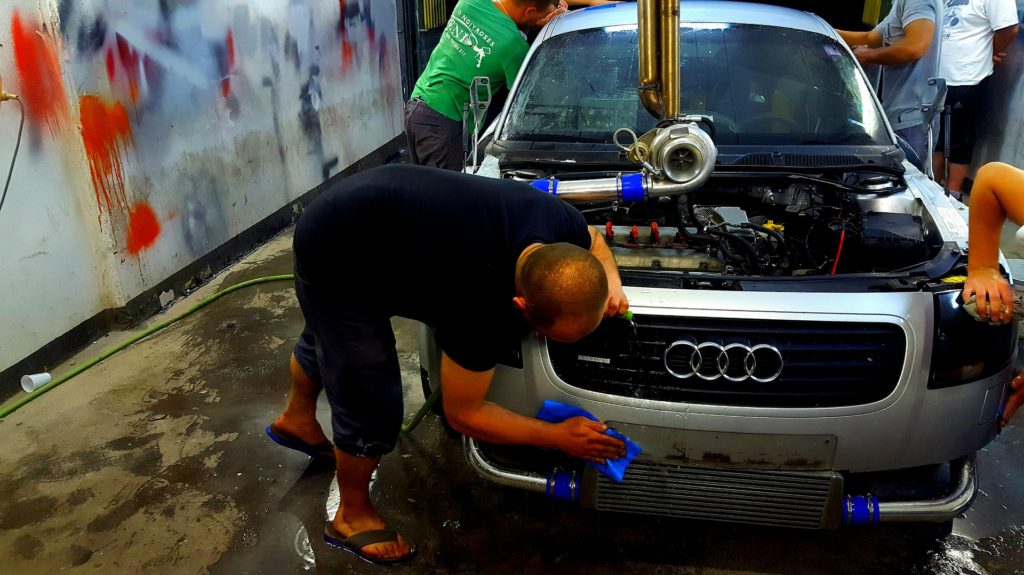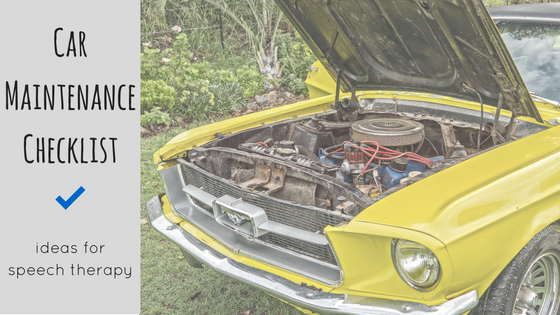Have you ever treated someone in speech therapy whose interests were outside your comfort zone? For me, it’s the “Handy” people! As a self-proclaimed non-handy person, I barely know how to use the right terminology with someone who is into cars, hunting, or woodworking! Checklists have made it much easier for me to structure questions, conversation, or assign relevant home programs. Today I am sharing a (free printable!) Car Maintenance Checklist. Read on for ideas on how to use this checklist in speech therapy to be person-centered and to target a variety of therapy goals.
In order to be sure this therapy activity is person-centered, here are some questions you could ask to decide how to change or add to the Car Maintenance Checklist:
- “Do you like to do car maintenance? What sort of tasks do you usually do for your car?”
- “Have you started doing this again? Have you noticed any challenges?”
- “Do you have ideas for how you could practice ***(speech therapy goal) using car maintenance at home?”
Car Maintenance Checklist:
There are so many great free checklist ideas online! What a quick way to make therapy meaningful and relevant for someone who loves to do this stuff. I compiled a simple starting checklist for your ease, but feel free to adapt for each Person you are treating. I left space on the bottom of the checklist so the Person you are working with can add their own ideas too!
Free Printable For You–> Car Maintenance Checklist
Sample Therapy Ideas:
I hope these ideas are useful or help you easily target a person-centered goal! If you would like other ideas for meaningful, relevant activities to use in speech therapy, please check out my Home Sweet Home Series.
| To Target Strategies or Skills in This Area: | The Patient Could Do This: |
| Verbal Expression | *Explain step-by-step how to do an item on the checklist
*Participate in unscripted dialogue *Naming for parts / supplies / etc. *Summarize follow-up steps needed based on checklist results |
| Written Expression | *Write checklist (phrases or sentences) when given verbal directions from SLP
*Write a summary of next steps required for car maintenance |
| Auditory Comprehension | *Comprehend 4 items to complete as part of the home program (when told by SLP)
*Use of breakdown/repair strategies *Use of writing notes to improve comprehension |
| Reading Comprehension | *Read phrases on checklist with 100% acc |
| Motor Speech | *Challenge ability to carry-over motor speech strategy or skill while explaining procedural information |
| Attention | *Sustain attention: Complete X-steps on checklist as assigned, with no cueing from others
*Selective attention: In busy or noisy environment, complete X-steps on checklist as assigned, with no cueing from others *Alternate attention: Complete x-steps on checklist while also alternating between another task (stopping for lunch, answering a phone, etc). *Divide attention: Talk on the phone while completing weekly car maintenance |
| Memory | *Prospective memory: Complete task on day or time as assigned
*Use external strategy to complete assigned item at assigned time |
| Thought Organization | *Organize car maintenance checklist, order that it should be completed, and supplies needed |
| Problem-Solving / Reasoning | *Problem-solve next steps if one of the maintenance items does not pass the test
*Generate appropriate follow-up questions to ask a car repair shop |
| Executive Function | *Evaluate strategy success during task, or plan how to adapt strategies for new situation.
*Plan home program task that could be a similar challenge |
| Pragmatics | *Use appropriate turn taking in conversation about car maintenance |
If you want more ideas of how to make your therapy functional and person-centered, check out the Home Sweet Home Series and Functional Toolbox posts (Garden Seed Packets, Tool Kit, Cookbook, Photos).
Make sure you get the latest functional therapy updates: “Like” Honeycomb Speech Therapy on Facebook or Pinterest, or sign up for email updates below.


I have used both the idea of car maintenance and the tool set with a couple of gentlemen, who did not have much for speech therapy. Both of these guys were willing to participate in therapy, and one said “now this makes some sense!”
In the toolbox therapy sessions, they named the tools and explained how to use the tools for different situations.
For the car maintenance checklist, they explained how to do complete the task and what parts were needed. This activity set the stage for sequencing when I asked questions and also self-correction if a step was missed or a part was omitted.